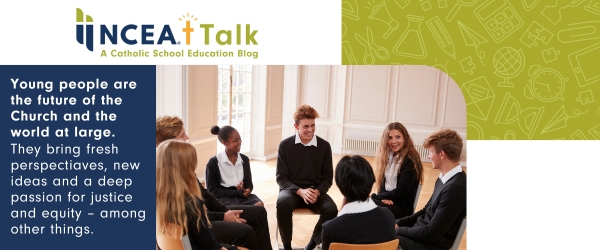Written by Megan Bissell, Research Project Manager, NCEA, [email protected]
When I came to NCEA earlier this year, we made a commitment to intentionally center young people in conversations about their experiences in Catholic education. It was evident that we, as an organization, believe that we cannot truly understand the impact of Catholic schools on our young people without hearing about it directly from them. NCEA’s commitment to deep listening enabled me to host a featured panel with an absolutely incredible group of young people from various schools in the Diocese of Dallas during NCEA 2023.
These young people blew my mind, but more than that, their genuine, positive, regard for their overall Catholic school experience was more than I expected. They very clearly articulated the benefits of their experience — even when compared against their peers and friends who may not be beneficiaries of Catholic school. They understand the value of service at their core and could talk about faith as an integral part of their lived experience, even if they were not rigorously practicing Catholics. The most important outcome from the panel was that it solidified the need to hear directly from young people about what truly impacts them.
Young people are the future of the Church and the world at large. They bring fresh perspectives, new ideas and a deep passion for justice and equity — among other things. By centering them in the quest for knowledge and conversations about the future of Catholic schools, we can gain valuable insights into what young people want and need from their education. This can help educators to better tailor their programs and curricula to meet the needs of their students, but more importantly, they can design their approach for engaging with young people. And administrators have an at-the-ready group to inform messaging for the school’s communications channels and enrollment efforts.
Centering the voices of young people can help to foster a deeper sense of community and belonging within Catholic schools. When students feel that their voices are heard and valued, they are more likely to feel connected to their school community and to each other. This can create a more foundational and inclusive learning environment where all students feel welcome and supported.
Another key benefit of centering the voices of young people is that it can help to increase their engagement and sense of ownership in their education. When students feel that their opinions and perspectives are valued, they are more likely to be invested in their learning and to take an active role in shaping their educational experiences. This can lead to better outcomes both academically and personally.
Young people help Catholic schools stay relevant and responsive to changing times. As society and culture continue to evolve, it is essential that Catholic schools adapt to meet the needs of their students and communities. By listening to young people and incorporating their perspectives into decision-making processes, Catholic schools can stay abreast of current trends and anticipate future needs.
In addition to these strategies, it is essential that Catholic schools foster an open and inclusive culture where students feel comfortable sharing their opinions and perspectives. This can be achieved through ongoing communication and dialogue between students and school leaders, as well as through the creation of safe spaces and forums where students can express their views without fear of judgment or retribution.
Centering the voices of young people is essential for ensuring that Catholic schools remain relevant and effective in today’s rapidly changing world. By listening to and incorporating the perspectives of their students, Catholic schools can create a more engaging, inclusive and supportive learning environment that meets the needs of all students. This, in turn, can lead to better academic and personal outcomes for young people and a stronger, more vibrant Catholic community. NCEA will continue to center the voices of young people in our research to gain a deeper understanding of the impact of the Catholic school experience and to develop resources that help educators feel equipped for the future.
